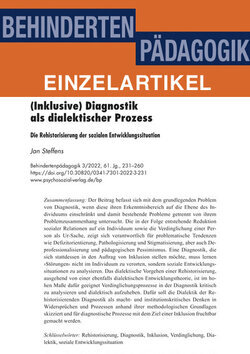30 Seiten, PDF-E-Book
Erschienen: September 2022
Bestell-Nr.: 23523
https://doi.org/10.30820/0341-7301-2022-3-231
abonnieren
Jan Steffens
(Inklusive) Diagnostik als dialektischer Prozess (PDF)
Die Rehistorisierung der sozialen Entwicklungssituation
Sofortdownload
Dies ist ein E-Book. Unsere E-Books sind mit einem personalisierten Wasserzeichen versehen,
jedoch frei von weiteren technischen Schutzmaßnahmen (»DRM«).
Erfahren Sie hier mehr zu den Datei-Formaten.
Der Beitrag befasst sich mit dem grundlegenden Problem von Diagnostik, wenn diese ihren Erkenntnisbereich auf die Ebene des Individuums einschränkt und damit bestehende Probleme getrennt von ihrem Problemzusammenhang untersucht. Die in der Folge entstehende Reduktion sozialer Relationen auf ein Individuum sowie die Verdinglichung einer Person als Ur-Sache, zeigt sich verantwortlich für problematische Tendenzen wie Defizitorientierung, Pathologisierung und Stigmatisierung, aber auch Deprofessionalisierung und pädagogischen Pessimismus. Eine Diagnostik, die sich stattdessen in den Auftrag von Inklusion stellen möchte, muss lernen ›Störungen‹ nicht im Individuum zu verorten, sondern soziale Entwicklungssituationen zu analysieren. Das dialektische Vorgehen einer Rehistorisierung, ausgehend von einer ebenfalls dialektischen Entwicklungstheorie, ist im hohen Maße dafür geeignet Verdinglichungsprozesse in der Diagnostik kritisch zu analysieren und dialektisch aufzuheben. Dafür soll die Dialektik der Rehistorisierenden Diagnostik als machtund institutionskritisches Denken in Widersprüchen und Prozessen anhand ihrer methodologischen Grundlagen skizziert und für diagnostische Prozesse mit dem Ziel einer Inklusion fruchtbar gemacht werden.
Abstract:
The article deals with the fundamental problem of diagnostics when it restricts its field of knowledge to the level of the individual and thus examines existing problems separately from their problem context. The resulting reduction of social relations to an individual as well as the reification of a person as a cause is responsible for problematic tendencies such as deficit orientation, pathologization and stigmatization, but also deprofessionalization and pedagogical pessimism. A diagnostic that instead wants to place itself in the mission of inclusion must learn not to locate ›disorders‹ in the individual, but to analyze social developmental situations. The dialectical procedure of rehistoricization, based on a likewise dialectical developmental theory, is highly suitable for critically analyzing reification processes in diagnostics and for dialectically abolishing them. For this purpose, the dialectic of rehistoricizing diagnostics as a powerand institution-critical thinking in contradictions and processes will be outlined on the basis of its methodological foundations and made fruitful for diagnostic processes with the goal of inclusion.
Abstract:
The article deals with the fundamental problem of diagnostics when it restricts its field of knowledge to the level of the individual and thus examines existing problems separately from their problem context. The resulting reduction of social relations to an individual as well as the reification of a person as a cause is responsible for problematic tendencies such as deficit orientation, pathologization and stigmatization, but also deprofessionalization and pedagogical pessimism. A diagnostic that instead wants to place itself in the mission of inclusion must learn not to locate ›disorders‹ in the individual, but to analyze social developmental situations. The dialectical procedure of rehistoricization, based on a likewise dialectical developmental theory, is highly suitable for critically analyzing reification processes in diagnostics and for dialectically abolishing them. For this purpose, the dialectic of rehistoricizing diagnostics as a powerand institution-critical thinking in contradictions and processes will be outlined on the basis of its methodological foundations and made fruitful for diagnostic processes with the goal of inclusion.
Erik WeberS. 227–230Editorial (PDF)
Jan SteffensS. 231–260(Inklusive) Diagnostik als dialektischer Prozess (PDF)
Die Rehistorisierung der sozialen EntwicklungssituationKristina KraftS. 261–278Fachberatung mit Rehistorisierender Diagnostik in institutionellen Lebenswelten (PDF)
Thomas HoffmannS. 279–290Rehistorisierung in der Schule (PDF)
Claudia Spiess, Manuel Zanardini & Annina Fantoni S. 291–308Behinderung und passives Wahlrecht (PDF)
Eine qualitative Untersuchung zur Situation von Politiker*innen mit Behinderung in der SchweizMonika Glück-ArndtS. 309–310Behindertenpädagogik in Hessen (PDF)
Schwerpunktthema: Aus der Praxis - für die PraxisSuna Korap, Dirk Petrat, Janine Somorowsky & Laura Villalba y Weinberg S. 311–326»Ein Statement setzen, das ist uns wichtig!« (PDF)
Das gemeinsame Graffiti-Projekt der Kasinoschule Höchst und der IGS Nordend gegen Rassismus und für VielfaltMartina Hehn-OldigesS. 327–329Rezension von: Reinhard Stähling & Barbara Wenders (2021): Worin unsere Stärke besteht (PDF)
Lena Briel & Nils Euker S. 330–335Aus der Verbandsarbeit (PDF)
Jan SteffensS. 231–260(Inklusive) Diagnostik als dialektischer Prozess (PDF)
Die Rehistorisierung der sozialen EntwicklungssituationKristina KraftS. 261–278Fachberatung mit Rehistorisierender Diagnostik in institutionellen Lebenswelten (PDF)
Thomas HoffmannS. 279–290Rehistorisierung in der Schule (PDF)
Claudia Spiess, Manuel Zanardini & Annina Fantoni S. 291–308Behinderung und passives Wahlrecht (PDF)
Eine qualitative Untersuchung zur Situation von Politiker*innen mit Behinderung in der SchweizMonika Glück-ArndtS. 309–310Behindertenpädagogik in Hessen (PDF)
Schwerpunktthema: Aus der Praxis - für die PraxisSuna Korap, Dirk Petrat, Janine Somorowsky & Laura Villalba y Weinberg S. 311–326»Ein Statement setzen, das ist uns wichtig!« (PDF)
Das gemeinsame Graffiti-Projekt der Kasinoschule Höchst und der IGS Nordend gegen Rassismus und für VielfaltMartina Hehn-OldigesS. 327–329Rezension von: Reinhard Stähling & Barbara Wenders (2021): Worin unsere Stärke besteht (PDF)
Lena Briel & Nils Euker S. 330–335Aus der Verbandsarbeit (PDF)

